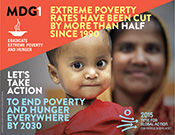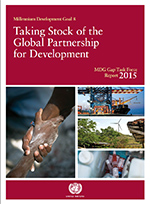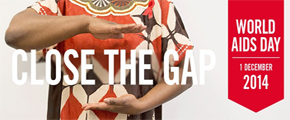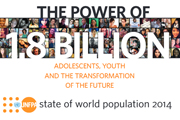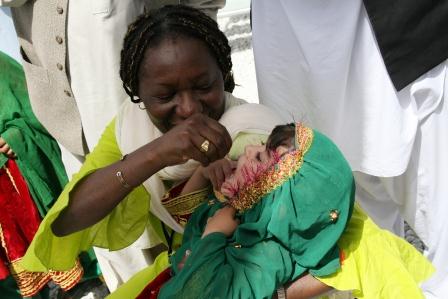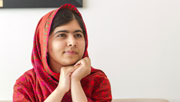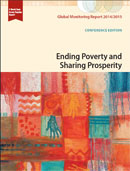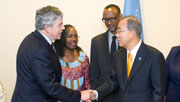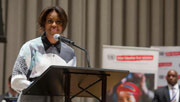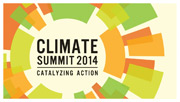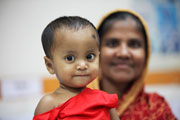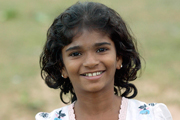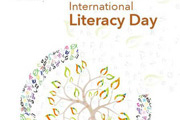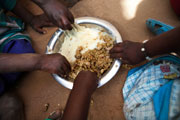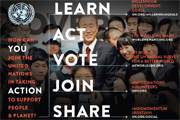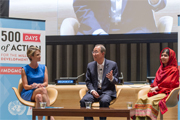News on Millennium Development Goals
Launch of the UN Sustainable Development Goals
As the MDGs era comes to a conclusion with the end of the year, 2016 ushers in the official launch of the bold and transformative 2030 Agenda for Sustainable Development adopted by world leaders last September at the United Nations.
The new Agenda calls on countries to begin efforts to achieve 17 Sustainable Development Goals (SDGs) over the next 15 years.
“The seventeen Sustainable Development Goals are our shared vision of humanity and a social contract between the world's leaders and the people,” said UN Secretary-General Ban Ki-moon. “They are a to-do list for people and planet, and a blueprint for success.”
The MDG Gap Task Force Report 2015 is now available
The “Taking Stock of the Global Partnership for Development” report of the UN MDG Gap Task Force monitors the recent achievements and challenges in the implementation of the Millennium Development Goal 8, while looking ahead towards the new sustainable development agenda that will be adopted by world leaders at the Sustainable Development Summit this month (September 25–27), and which will include the launch of a new set of Sustainable Development Goals. Download the MDG Gap Task Force Report 2015 ![]()
Millennium Development Goals Report 2015 now available
This report is based on a master set of data that has been compiled by the Inter-Agency and Expert
Group on MDG Indicators led by the Department of Economic and Social Affairs of the United Nations
Secretariat, in response to the wishes of the General Assembly for periodic assessment of progress
towards the MDGs. Download the Millennium Development Goals Report 2015 ![]()
‘Journey towards bold climate action is at a critical moment,’ UN General Assembly told
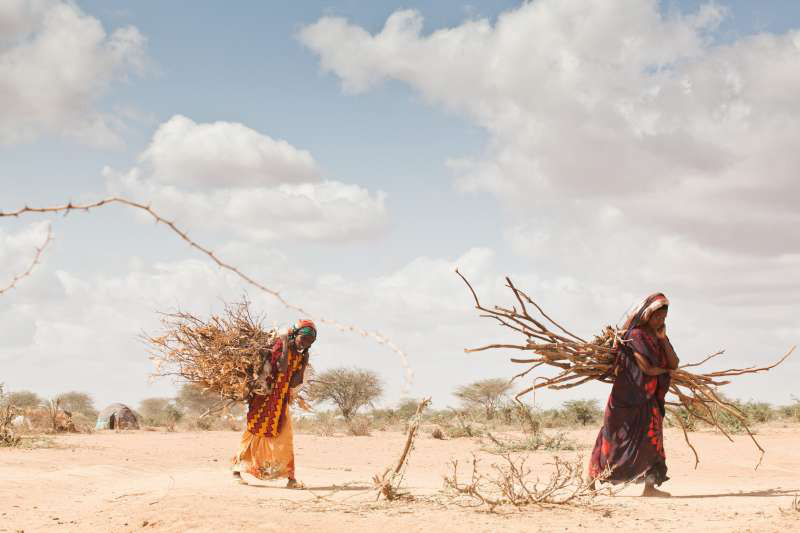
Development cannot be sustainable if it does not address the challenge of climate change, United Nations Secretary-General Ban Ki-moon told Member States today as he opened a High-Level Event on Climate Change convened in New York by the President of the UN General Assembly, Sam Kutesa.
Pope Francis and UN agency discuss sustainable future of agriculture
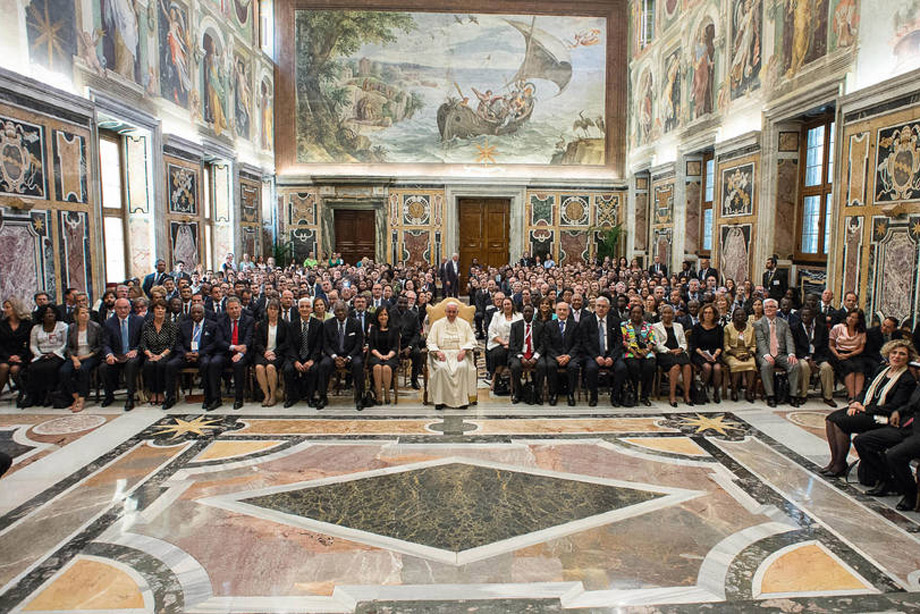
Addressing over a hundred delegates attending a United Nations Food and Agriculture Organization (FAO) conference in Rome, Pope Francis today urged Member States to work toward combatting food waste, reducing the volatility of food prices, and creating a sense of global solidarity to ensure food security for all people.
UN invites world’s seven billion people to become agents of change on World Environment Day

The United Nations invited each of the seven billion people on the planet to mark this year’s World Environment Day on 5 June, stressing the need of sustainable consumption worldwide.
‘Give young people decent jobs and they will create a better future’ – UN chief
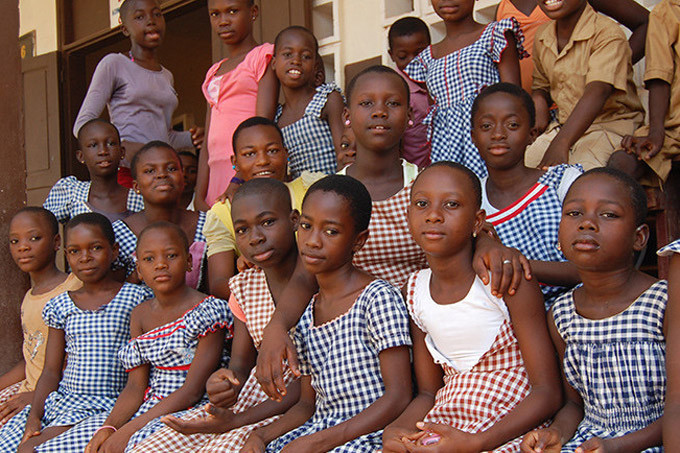
When young people have decent jobs, political weight, negotiating muscle and real influence in the world, they will create a better future, United Nations Secretary-General Ban Ki-moon said today as he kicked off a Headquarters event on empowering youth through employment.
On International Day, Ban says biodiversity is essential to sustainable development, eradicating poverty

Variety of life on Earth is essential for the welfare of current and future generations, Secretary-General Ban Ki-moon said on the International Day for Biological Diversity.
At UN forum, Ban urges world leaders aim to set global roadmap for education until 2030
Education is not a privilege but rather a birthright that secures human rights and fights violent extremism, United Nations Secretary-General Ban Ki-moon said in Incheon, Republic of Korea, as he opened the World Education Forum 2015 which aims to set the roadmap for global education until 2030.
New UN-backed report emphasizes possible contribution of forests to ending hunger
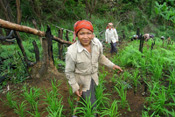
A new United Nations-backed report on the link between forests and food production and nutrition says that woodlands could be the key to ending hunger and will be intimately linked to the global fight against climate change.
UN agency unveils alternative policy agenda to transform economies, make gender equality a reality
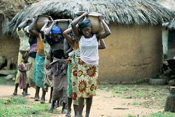
A major new report released today in seven locations around the world by the United Nations entity for gender equality and women’s empowerment (UN Women) calls for the transformation of economies to make women’s rights and equality a reality.
World Malaria Day: call to close gaps in prevention and treatment to defeat malaria

The World Health Organization is calling on the global health community to urgently address significant gaps in the prevention, diagnosis and treatment of malaria.
On International Women's Day, UN urges more action to achieve gender equality
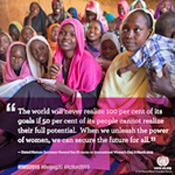
To mark International Women's Day on 8 March, senior United Nations officials highlighted the Beijing Declaration and Platform for Action, a historic roadmap signed by 189 governments 20 years ago that set the agenda for realizing women's rights. The ongoing Commission on the Status of Women, will bring representatives of UN Member States, civil society groups and UN entities together to take stock of where women stand today.
Ahead of global risk reduction conference, UN review finds vast majority of disasters climate-related
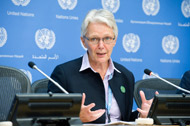
The United Nations office dedicated to disaster risk reduction today appealed to world leaders ahead of a major gathering in northern Japan next week to provide clear, action-oriented guidance to tackle the underlying drivers of risk, such as climate change, which now accounts for 87 per cent of the disasters that have killed some 700,000 people over the past decade.
Fuelled by ‘strong’ cereal stocks, world food prices dip to lowest level since July 2010
Food prices dipped to a 55-month low in February, dropping a steady per cent from the previous month and 14 per cent below its level compared to a year earlier, the United Nations Food and Agriculture Organization (FAO) reported today. The continuing decline- lowest level since July 2010 - reflects a robust supply environment and ongoing weakness in many currencies versus the United States dollar, Michael Griffin, FAO's dairy and livestock market expert, confirmed in a statement.
UN agency photo competition shines spotlight on ‘family meal’ in achieving 'Zero Hunger'
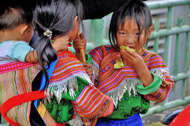
Scenes of families eating together in Burundi, Laos and the Philippines won a photo competition judged by celebrity chef Jamie Oliver aimed at demonstrating the simple yet powerful role provided by sitting tougher and eating as a family,
according to the World Food Programme (WFP). The photographs aimed at highlighting the importance of food and nutrition in everyday life and the role families play in achieving Zero Hunger.
Protecting Women and Girls Against Female Genital Mutilation
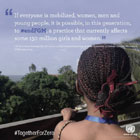
On the International Day of Zero Tolerance for Female Genital Mutilation the UN Secretary-General called on health workers around the world to put an end to a 'deeply harmful' practice and help improve the health and welfare of women and girls worldwide.
20th Anniversary of World Summit for Social Development
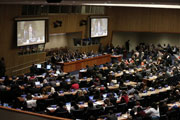
Twenty years after leaders from 117 countries met in Copenhagen at the World Summit on Social Development, progress on eliminating poverty, job creation and social integration have advanced unevenly, according to officials attending a review of implementation efforts at the UN Commission for Social Development.
New Champions join efforts for an AIDS-free generation in Africa
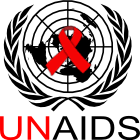
Ahead of the African Union Summit, former Presidents of Malawi, Mali, Nigeria and South Africa are among the new Champions committing to Fast-Tracking access to HIV prevention and treatment services in sub-Saharan Africa, UNAIDS announced. With 24.7 million people living with HIV in sub-Saharan Africa in 2013, Sub-Saharan Africa remains the region most affected by the AIDS epidemic.
Launch of World Economic Situation and Prospects 2015 (WESP) report
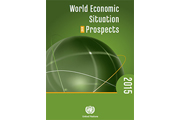
Global economic growth is forecast to increase marginally over the next two years, according to the United Nations World Economic Situation and Prospects 2015 (WESP) report, launched on 19 January. However, upcoming US interest rate increases, remaining euro area fragility, a further slowdown in developing economies and geopolitical conflicts such as in Ukraine, and the Ebola epidemic pose major concerns for global economic outlook.
WHO’s World Malaria Report 2014 shows malaria cases steadily declining
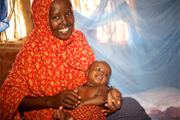
Sarah Hoibak/UNHCR
The number people dying from malaria has fallen dramatically since 2000 and malaria cases are also steadily declining, according to the World malaria report 2014. Between 2000 and 2013, the malaria mortality rate decreased by 47% worldwide and by 54% in the WHO African Region - where about 90% of malaria deaths occur. “We can win the fight against malaria,” says Dr Margaret Chan, Director-General, WHO.
Close the gap this World AIDS Day
World AIDS Day 2014 is an opportunity to harness the power of social change to put people first and close the gap. Ending the AIDS epidemic by 2030 is possible, but only by closing the gap between people who have access to HIV prevention, treatment, care and support services and people who are being left behind. Closing the gap means empowering and enabling all people, everywhere, to access the services they need.
Orange the World in 16 days

From 25 November, the International Day for the Elimination of Violence against Women, to 10 December, Human Rights Day, the 16 Days of Activism against Gender-Based Violence Campaign is a time to galvanize action to end violence against women and girls around the world. This year, the United Nations Secretary-General’s Campaign UNiTE to End Violence against Women invites you to “Orange YOUR Neighbourhood.”
Innovation can drive change for most disadvantaged children - UNICEF Report
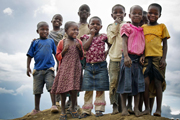
Credit: UNICEF/Holt
Urgent action is needed to prevent millions of children from missing out on the benefits of innovation, UNICEF said in the State of World’s Children 2015: Reimagine the Future launched on the 25th anniversary of the Convention on the Rights of the Child. Connectivity and collaboration can fuel new global networks to leverage innovation to reach every child, according to the children’s agency.
World Toilet Day marked worldwide
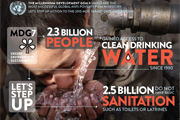
Credit: UNTV
2.5 billion people do not have access to proper sanitation, including toilets or latrines, with dramatic consequences on human health, dignity and security, the environment, and social and economic development. “Equality, Dignity and the Link Between Gender-Based Violence and Sanitation” is the theme for this year’s World Toilet Day, which seeks to put a spotlight on the threat of sexual violence that women and girls face due to the loss of privacy.
Nutrition conference calls for action
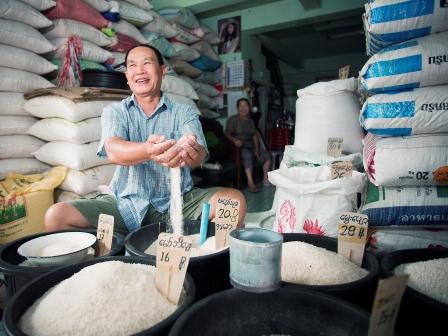
Credit: UN Photo/Kibae Park
Ministers and top officials from over 170 countries endorse political Declaration and Framework for Action to tackle hunger and obesity at Second International Conference on Nutrition. In a major step towards eradicating malnutrition worldwide, over 170 countries made a number of concrete commitments and adopted a series of recommendations on policies and investments aimed at ensuring that all people have access to healthier and more sustainable diets.
UNFPA State of the World Population: The Power of 1.8 Billion: Adolescents, youth and the transformation of the future
Young people matter. They matter because an unprecedented 1.8 billion youth are alive today, and because they are the shapers and leaders of our global future. They matter because they have inherent human rights that must be fulfilled. Yet, in a world of adult concerns, young people are often overlooked. This tendency cries out for urgent correction, because it imperils youth as well as economies and societies at large. #SWOP2014
World leaders adopt ambitious 10 year action-plan for landlocked developing countries

UN Photo/Andi Gitow
The United Nations General Assembly today adopted a 10 year action-plan aimed at accelerating sustainable development in the world’s 32 landlocked developing countries (LLDCs). The Vienna Programme of Action with six clearly defined priorities encapsulates a unified stance by the international community on a broad array of crucial issues, from concrete steps toward the structural transformation of LLDCs’ economies and infrastructure development to improving international trade and bolstering regional integration and cooperation.
Watch UN Stories: India: Managing Menstrual Hygiene

Credit: UNTV
Young girls in India are struggling to get an education due to the lack of facilities and understanding about their monthly menstruation. Combined with a social stigma that has been handed down for generations, many girls feel too ashamed to go to school at all. The UN’s Water Supply and Sanitation Collaborative Council is working with the Indian government to change the curriculum in India, and change the future of girls.
First ever World Cities Day focuses on sustainable urban planning

Credit: UN Photo/Kibae Park
As the world's urban areas inevitably expand, growing both in size and in population, they will also need to transition into better planned and better managed environments or risk exacerbating negative trends, the United Nations warned. Marking the inaugural edition of World Cities Day, UN Secretary-General Ban Ki-moon declared humanity's future to be an urban one as the world's population will increasingly become city-dwelling.
Far greater effort needed to eradicate extreme poverty in world’s poorest nations – UN report
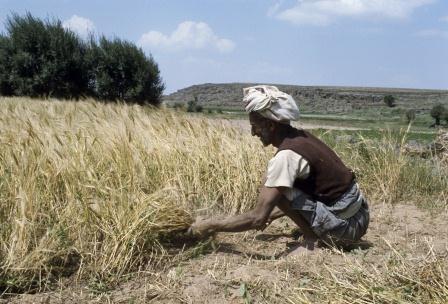
UN Photo/Kay Muldoon
While the world’s 48 most vulnerable nations continue to make in-roads into poverty reduction, a far greater effort is needed if these countries are to eradicate extreme poverty by 2020, according to The State of Least Developed Countries 2014. The report calls for paying greater attention to eradicating extreme poverty in the poorest countries within the on-going post-2015 development agenda.
Ten million childhood disabilities prevented in campaign to end polio – UNICEF
Every day, a thousand or so children have been protected from disability during a 26-year global effort to eradicate polio. The worldwide campaign has immunised millions of previously-unreached children across the globe, UNICEF said. Some 10 million people today would otherwise have been paralysed, while an additional 1.5 million lives have been saved through the routine administration of Vitamin A during polio vaccination drives.
Leave no one behind focus of International Day for the Eradication of Poverty
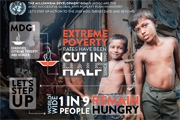
Leave no one behind: think, decide and act together against extreme poverty” is the focus of this year’s International Day for the Eradication of Poverty. Events organized by the UN, ATD Fourth World, the International Committee on 17 October as well as the Missions of Burkina and France, seek to raise awareness of the challenges and need to secure the participation of those living in extreme poverty in the post-2015 development agenda.
UN celebrates awarding of Nobel Peace Prize to children’s rights activists
The United Nations lauded today’s awarding of the Nobel Peace Prize to two human rights activists, saying the winners had received well-deserved recognition for championing children’s rights around the world. Pakistan’s Malala Yousafzai, an ardent campaigner for a girl’s right to an education, and India’s Kailash Satyarthi, an activist fighting child labour, are the joint recipients of this year’s prize.
Global economy to lose billions without action to stop ocean acidification, UN report warns
The global economy could be losing as much as $1 trillion annually by the end of the century if countries do not take urgent steps to stop ocean acidification, says a report issued by the Convention on Biological Diversity at the 12th meeting of the Conference of the Parties to the CBD. Ocean acidification is the ongoing decrease in the pH of the Earth’s oceans.
World Bank-IMF Report Gauges Progress on Development Goals
Much more work needs to be done to end poverty and close the gap in living standards between those in the bottom 40 percent and the top 60 percent of the population around the world, says the Global Monitoring Report 2014/2015, released by the World Bank and International Monetary Fund (IMF). GMR 2014/2015 continues to monitor progress on the Millennium Development Goals, which inspired the WBG twin goals.
MDG Advocates Launch Leaders Report
Launching new report, MDG Advocates outline challenges and opportunities for achieving the Millennium Development Goals by end of 2015. Led by the Prime Minister of Norway and President of the Republic of Rwanda, the MDG Leaders praise successes of improving people’s lives and demand more action during a high-level event. “The MDGs have transformed the lives of millions of people,” Secretary-General Ban Ki-moon said.
Global leaders show support and pledge their commitment to quality education
The First Lady of the United States, Michelle Obama, delivered the special key-note address today at the Global Education First Initiative’s (GEFI) high-level event. Mrs. Obama vowed to work with world leaders and education advocates to ensure all girls and young women have the opportunity to go to school; calling for quality education and the empowerment of girls and women to form part of the post-2015 development agenda.
UN Climate Summit 2014
UN Secretary-General Ban Ki-moon has invited world leaders, from government, finance, business, and civil society to Climate Summit 2014 to galvanize and catalyze climate action. He has asked these leaders to bring bold announcements and actions to the Summit that will reduce emissions, strengthen climate resilience, and mobilize political will for a meaningful legal agreement in 2015.
World leaders reaffirm commitments to placing people at the centre of development
A UN General Assembly special session examined 20 years of actions taken by governments to improve people’s lives and address population issues.
“We must renew our pledge to protect people – especially women and girls – as we strive to eradicate extreme poverty, protect the rights and dignity of all people and secure the future of our planet for generations to come,” UN Secretary-General Ban Ki-moon said.
New UN Report Shows Gaps on MDGs
Poorest countries need more access to aid, trade, debt relief, medicines and technologies, says new UN report. Persistent gaps between promises made and delivered by developed countries hold back greater progress on the Millennium Development Goals. The MDG Gap Task Force Report 2014, entitled, “The State of the Global Partnership for Development,” tracks delivery on commitments listed under Millennium Development Goal 8—the global partnership for development.
World hunger falls, but 805 million still chronically undernourished
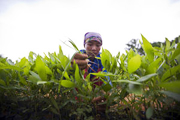
FAO/Juan Manuel Baliellas
The MDG target to halve proportion of world’s hungry is still within reach by end of 2015. One in nine people suffer from hunger, according to a new UN report. The State of Food Insecurity in the World confirmed a positive trend which has seen the number of hungry people decline globally by more than 100 million over the last decade and by more than 200 million since 1990-92.
New Data Show Child Mortality Rates Falling Faster Than Ever
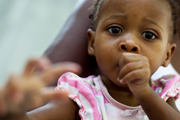
UN Photo/Logan Abassi
New United Nations data show that under-five mortality rates have dropped by 49 per cent between 1990 and 2013. New estimates in Levels and Trends in Child Mortality 2014 show that in 2013, 6.3 million children under five died from mostly preventable causes, around 200,000 fewer than in 2012, but still equal to nearly 17,000 child deaths each day.
Progress for children in South Asia, but inequalities still exist: UNICEF report
A new UNICEF report says there has been progress in the health and well-being of children in South Asia over the last 25 years, but glaring inequalities remain. "More than 2 million children in South Asia die from preventable causes before their fifth birthday ever year and more than 35 percent of the region's children have chronic malnutrition,” said Karin Hulshof, Regional Director for UNICEF in South Asia.
Record Greenhouse Gas Levels Impact Atmosphere and Oceans
The amount of greenhouse gases in the atmosphere reached a new record high in 2013, propelled by a surge in levels of carbon dioxide. This is according to the World Meteorological Organization’s annual Greenhouse Gas Bulletin, which injected even greater urgency into the need for concerted international action against accelerating and potentially devastating climate change.
International Literacy Day: Literacy and Sustainable Development
The theme of International Literacy Day 2014 is “Literacy and Sustainable Development”. Literacy is one of the key elements needed to promote sustainable development, as it empowers people so that they can make the right decisions in the areas of economic growth, social development and environmental integration. Literacy is a basis for lifelong learning and plays a crucial foundational role in the creation of sustainable, prosperous and peaceful societies.
FAO-WHO video shows how nutrition is a public issue
Hundreds of millions of people around the world continue to suffer from hunger and malnutrition. Governments are urged to make stronger commitments at November’s Second International Conference on Nutrition (ICN2) to ensure healthier diets for all. That's according to the Food and Agriculture Organization and the World Health Organization of the United Nations. This report has more information on the current global nutrition challenges.
Secretary-General’s message on 500 Days of Action for the MDGs
“There are many fires raging around the world today -- political turmoil, bloodshed, public health emergencies and human rights abuses. But there also burns a flame of hope – encouraging progress in the global drive to improve the lives of the world’s poorest through the Millennium Development Goals. Adopted by world leaders in the year 2000, the MDGs are an ambitious 15-year roadmap to fight poverty, hunger and disease, protect the environment and expand education, basic health and women’s empowerment…[Read the full statement]
Secretary-General and Malala celebrated 500 Days of Action for MDGs
Malala Yousafzai joined UN Secretary-General Ban Ki-moon, Amy Robach and young people for an interactive conversation at the United Nations to celebrate 500 Days of Action for the Millennium Development Goals. It's not too late to join the conversation on the MDGs using #MDGmomentum. The 500 Days event was webcast live and can be found on UN Web TV. The UN Statistics Division produced a video with the latest figures on the MDGs. Mr. Ban kicked off a Week of Action for MDG Momentum in China on 16 August.
Human Development Report 2014
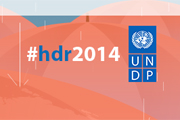
Photo credit: UNDP
2.2 billion people are poor or near-poor, warns 2014 Human Development Report on vulnerability and resilience. Calls for universal provision of basic social services, and stronger policies for social protection and full employment to advance and secure development progress. Persistent vulnerability threatens human development, and unless it is systematically tackled by policies and social norms, progress will be neither equitable nor sustainable. #hdr2014
New UN data shows need for urgent action to end female genital mutilation, child marriage
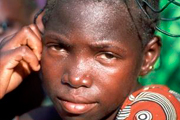
UN/DPI Photo by Evan Schneider
New data by UNICEF shows the need for urgent action to end female genital mutilation and child marriage – two practices that affect millions of girls across the globe. According to the newly-released data, more than 130 million girls and women have experienced some form of female genital mutilation, also known as FGM, in the 29 countries in Africa and the Middle East where the harmful practice is most common. #GirlSummit
Ending the AIDS epidemic by 2030 requires smart scale-up to close the gap: UNAIDS
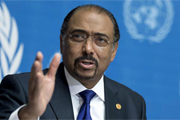
UN Photo/Jean-Marc Ferré
A new report by UNAIDS shows that 19 million of the 35 million people living with HIV globally do not know their HIV-positive status. “Whether you live or die should not depend on access to an HIV test,” said Michel Sidibé, Executive Director of UNAIDS. In sub-Saharan Africa, nearly 90 per cent of people who know their HIV-positive status are on treatment.
58 Million primary school age children out of school
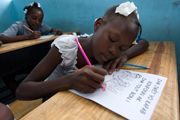
Credit: UN Photo/Logan Abassi
UNESCO reports that 58 million children aged 6 to 11 are still out of school, showing little overall improvement since 2007. But positive change is possible, 17 countries have reduced their out-of-school populations by almost 90 per cent in a little over a decade. These countries have invested in positive actions such as abolishing school fees, introducing more relevant curricula and providing financial support to struggling families.
More Governments now online but greater effort needed to boost access to e-services, UN finds

UN Photo/Mark Garten
E-government—digital interactions between governments and people—varies greatly among and within regions, but most countries are making progress on providing greater access, according to the 2014 UN E-Government Survey. The report shows that many countries are expanding electronic participation, utilizing more mobile and social media tools, expanding usage and making more government data available online. However, challenges remain.
Celebrate World Day to Combat Desertification on 17 June

UN Photo/Evan Schneider
The 2014 Theme is Land Belongs to the Future - Let’s Climate Proof It. Approximately 1.5 billion people globally depend on degrading areas for their livelihoods, and nearly half of the world’s very poor (42%) live in degraded areas, making them some of the most insecure places in the world, and in some cases their instability can destabilize entire political regions. #climateproofmyland
SE4All Forum seeks to mobilize investment, action for sustainable energy for all

UN Photo/R Kollar
Over 1,000 participants from government, business, international organizations and civil society groups gathered at UN Headquarters for a three-day forum designed to mobilize investment and action to realize the goal of ensuring Sustainable Energy for All.
The Forum will launch the UN Decade on Sustainable Energy for All with a two-year focus on energy for women and children’s health. A UN-backed report said renewable energy capacity grew 8.3 per cent in 2013.
Action needed to safeguard genetic diversity of the world's forests-FAO

UN Photo/Kibae Park
According to The State of the World's Forest Genetic Resources report, half of the forest species reported as regularly utilized by countries are threatened by the conversion of forests to pastures and farmland, overexploitation, and the impacts of climate change.
The contribution of forests and trees to boosting food security, reducing poverty, and promoting sustainable development depends on the availability of a rich diversity of tree species.
State of World’s Midwifery Report 2014
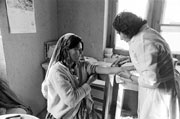
UN Photo/Muldoon/ARA
Midwives are the unsung heroes of maternal and newborn health. They can prevent about two thirds of deaths among women and newborns. UNFPA and partners produced 2014 edition of The State of the World's Midwifery report to shed light on the important role of these healthcare professionals. The report shines a light on the vast shortage of midwives across low- and middle-income countries, and on the progress made since our inaugural report in 2011.
International Day for Biological Diversity focuses on Islands

UN Photo/Eskinder Debebe
Islands and their surrounding near-shore marine areas constitute unique ecosystems often comprising many plant and animal species that are endemic—found nowhere else on Earth.
The legacy of a unique evolutionary history these ecosystems are irreplaceable treasures. They are also key to the livelihood, economy, well-being and cultural identity of 600 million islanders—one-tenth of the world’s population. #islands2014
New UN report on water and sanitation
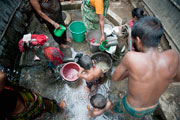
UN Photo/Kibae Park
Since 1990, almost 2 billion people globally have gained access to improved sanitation, and 2.3 billion have gained access to drinking-water from improved sources.
Some 1.6 billion of these people have piped water connections in their homes or compounds, according to a new WHO/UNICEF report, which also highlights a narrowing disparity in access to cleaner water and better sanitation between rural and urban areas.
Steady progress on saving mothers’ lives: WHO
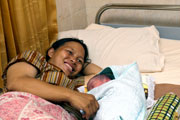
UN Photo/Mark Garten
New UN data show a 45 per cent reduction in maternal deaths since 1990. An estimated 289,000 women died in 2013 due to complications in pregnancy and childbirth, down from 523,000 in 1990. Eleven countries that had high levels of maternal mortality in 1990 have already reached the MDG5 target of a 75 per cent reduction in maternal mortality. Check out and share these infographics.
Two-thirds of world’s nearly 3 billion internet users from developing countries: ITU

UN Photo/Rick Bajornas
New figures released by ITU today indicate that, by end 2014, there will be almost 3 billion Internet users, two-thirds of them coming from the developing world, and that the number of mobile-broadband subscriptions will reach 2.3 billion globally. Fifty-five per cent of these subscriptions are expected to be in the developing world. Increasing access to technologies is part of MDG8.
A historic moment to defeat malaria
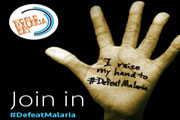
This year’s World Malaria Day—observed annually on 25 April— is marked as the international community is accelerating progress towards the Millennium Development Goals. According to the UN Special Envoy for Malaria, investments to fight malaria saved over 3 million lives since 2000 but more action is needed to make historic strides for breaking this leading global killer of children.
Roll Back Malaria Campaign| Key facts about malaria| #DefeatMalaria
Sanitation and Water for All
Improving access to water and sanitation can help mitigate poverty and disease, and accelerate achievement of the Millennium Development Goals. At the High Level Meeting for the Sanitation and Water for All initiative (SWA), governments, banks, UN agencies and civil society evaluated progress on over 400 commitments made for improving water and sanitation access for the world.
| Progress chart on SWA commitments| UN Secretary-General’s remarks|
Global Education Action
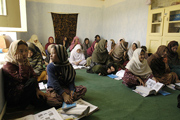
UN Photo/ UNAMA
The UN is joining forces with global leaders, civil society and celebrities to get all children into school by 2015. The Emergency Coalition for Global Education Action will aim to accelerate progress on the education targets of the Millennium Development Goals, and calls for: zero child marriage; zero child labour; zero discrimination against girls; and zero exclusion from education.
Commission on Population and Development

UN Photo/Kibae Park
As a precursor to the Millennium Development Goals, the Cairo Conference in 1994 reflected a consensus among 179 UN Member States and others that individual human beings should be the focus of efforts promoting social and economic development. This year’s Commission will identify the major progress and challenges in addressing global population issues over the last 20 years. (Follow on Twitter using #CPD47 | UN Deputy Secretary-General’s message).
Investing in health speeds economic progress
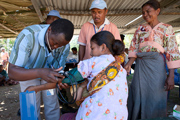
UN Photo/Martine Perret
Large-scale malaria interventions have saved millions of lives. “Since the Millennium Development Goals were launched, we have seen proof that fighting malaria is a good investment that saves lives and speeds up economic progress,” said United Nations Secretary-General Ban Ki-moon at a recent African Union-sponsored Roll Back Malaria event in Brussels. The Secretary-General encouraged African decision- makers to amplify investments in malaria control programmes.
World Water Day: Water & Energy
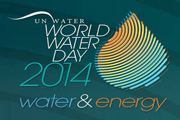
Since 1990, more than 2 billion people gained access to clean drinking water. Continued progress is possible for millions of people still without access to safe drinking water, sanitation, and energy services. This year’s World Water Day—observed annually on 22 March—promotes sustainable practices in the realm of water and energy.
Join #WorldWaterDay | Share Water Day graphics| Learn about MDG 7
Positive results in the fight against hunger
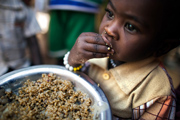
UN Photo/Albert González Farran
At the Food and Agriculture Organization’s (FAO) conference for Asia and the Pacific, a number of countries adopted a roadmap to push for zero hunger and greater food security in the region. In another positive trend, the UN World Food Programme and FAO are empowering sustainable results by providing training and technical support to small-scale farmers in Somalia. See how in this photo essay.
Commission on the Status of Women
The fifty-eighth session of the Commission on the Status of Women (CSW) takes place at United Nations Headquarters in New York from 10 to 21 March 2014. This year, over 6,000 representatives of the 193 Member States, UN and non-governmental organizations (NGOs) will discuss challenges and achievements in the implementation of the Millennium Development Goals for women and girls. Join the conversation using #CSW58.
Equality for women is progress for all
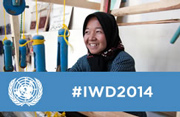
International Women’s Day, celebrated annually on 8 March, is an opportunity to review the challenges and achievements in the implementation of Millennium Development Goals for women and girls. “The evidence is clear: equality for women means progress for all,” Secretary-General Ban Ki-moon says in his message for the Day. Join the conversation using #IWD2014 and follow all the UN’s IWD events.
World Day of Social Justice

“The World Day of Social Justice is observed to highlight the power of global solidarity to advance opportunity for all,” the UN Secretary-General said. UN leadership urged the international community to amplify efforts for accelerating MDG progress. The UN annually observes the World Day of Social Justice on 20 February. #SocialJustice
.
Rights at the heart of development

Evidence from the latest International Conference on Population and Development (ICPD) Global Review Report shows that 70 percent of governments have said equality and rights are priorities for development. The landmark report, which gathers data form 176 Member States and inputs from civil society, also highlights achievements in the fight against poverty and addresses gaps in tackling inequalities endured by women and children.
Achieving quality education for all
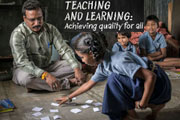
The 2013/4 Education for All Global Monitoring Report shows why education is pivotal for development in a rapidly changing world. The report highlights the need to promote quality education by investing wisely in teachers. According to the report, some 125 million school children around the world are unable to read a single sentence, even after four years of attendance.
Investing in girls’ empowerment
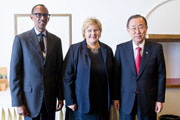
Leaders of the MDG Advocacy Group participated in a special event at Davos called, Scaling up Success: Investing in Girl Empowerment for MDG Acceleration. “We have to take stock and make a final push for success. And this demands that we invest in the more than half a billion adolescent girls in developing countries who can help drive progress across the MDG agenda,” the Secretary-General said.
Sustainable food systems crucial to fighting hunger
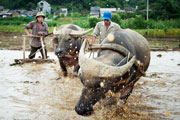
At the Global Forum for Food and Agriculture, the Food and Agriculture Organization of the United Nations (FAO) highlighted the positive role sustainable food systems can play in the fight against hunger. Every day, 840 million people go hungry. "We need to produce nutritious food for all people today while also protecting the capacity of future generations to feed themselves,” said Helena Semedo, FAO Deputy Director-General.
Seizing momentum for 2014

In a briefing on UN challenges for 2014, the Secretary-General spoke on the MDGs and post-2015, saying, “Political leaders are deeply engaged in the global discussion on development, key constituencies are mobilized and we increasingly know what works. We must seize this momentum.”
UN officials stress MDG acceleration at 'Group of 77' meeting
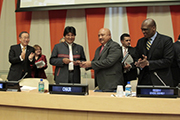
UN officials stressed the importance of fulfilling development commitments and accelerating achievement of the MDGs at the annual handover ceremony of the chairmanship of the Group of 77 and China. "As never before, we have the tools to eradicate poverty, improve social and economic well-being and lay the foundations for a sustainable future," the Secretary-General said to Member States.
View archives:












